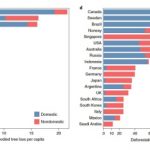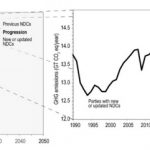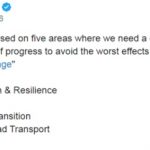A new report by the IEA reveals that global spending on clean energy technologies and infrastructure is on track to hit $2tn in 2024, driven largely by attractive cost reductions, improving supply chains, energy security, and government policies. This is despite higher financing costs for new projects. The combined investment in renewable power and grids only recently overtook the amount spent on fossil fuels, in 2023. 2024 will see it at double … [Read more...]
Green Steelmakers’ global future: importing the Iron from where Renewables are cheap, the Ore abundant
Governments in Europe have allocated around €5bn to 10 commercial-scale hydrogen-ready DRI (direct reduced iron) facilities for steelmaking, but even with these generous subsidies steelmakers are struggling to reach final investment decisions, citing high costs for domestic hydrogen as a barrier. And when you consider that over €400bn is needed to transition the entire European sector to hydrogen-based steelmaking, a totally new way of thinking … [Read more...]
Scaling Hydrogen financing in Emerging Markets and Developing Countries
To meet the global target for clean hydrogen of 10-15% of energy use by 2050 we need to produce 40m tonnes by 2030. The rich OECD countries simply do not have the renewables resources to do it alone. So there must be a global effort to actively support hydrogen production in Emerging Markets and Developing Countries (EMDCs), explain Carolina Lopez Rocha and Dolf Gielen at the World Bank Group and Ignacio de Calonje at the IFC. They summarise the … [Read more...]
Carbon Pricing: almost 25% of emissions now covered globally, but coverage and prices must rise further
Despite early scepticism, carbon pricing is making its mark globally. Today almost a quarter of global greenhouse gas (GHG) emissions are covered by a carbon price, compared to just 7% ten years ago. 73 national and sub-national jurisdictions have carbon pricing, explain Joseph Pryor and Venkat Ramana Putti at The World Bank, writing for the Florence School of Regulation and quoting from the World Bank’s State and Trends of Carbon Pricing 2023 … [Read more...]
CO2 emissions from Land Use: country-level data for turning “emitters” into “sinks”
Until carbon capture technologies take off (if at all!), the world’s CO2 removals depend entirely on nature. Clemens Schwingshackl, Wolfgang Obermeier and Julia Pongratz at Ludwig Maximilian University of Munich, writing for Carbon Brief, review the latest data on “carbon fluxes” which measure whether the land is a net “source” of carbon or a “sink.” Flux measurements are categorised: deforestation, forestation, wood-harvest emissions, removals … [Read more...]
The U.S. should support the EU’s Carbon Border Adjustment Mechanism (CBAM)
The U.S. should get behind Europe’s Carbon Border Adjustment Mechanism (CBAM), says Joseph Majkut at the Center for Strategic and International Studies. Under the EU’s newest agreement, anyone importing CBAM-listed goods into Europe will have to report the emissions associated with their products starting in October, and ultimately face tariffs if those emissions exceed those of the equivalent products made in the EU. The current list is iron and … [Read more...]
Biofuel is approaching a feedstock crunch. How bad? And what must be done?
The IEA is warning that biodiesel, renewable diesel and biojet fuel producers are heading for a feedstock supply crunch over the next five years. Rising prices are the signal to seek out new supplies and solutions, which should – and are - driving the development of government programmes and industry innovation. Here, the IEA lays out their projections for 2022-2027, covering all the main feedstocks: sugars, maize, soy oil, rapeseed oil, palm … [Read more...]
EVs vs Biofuels: new study looks at ethanol’s impact on agricultural land use, food prices, emissions
For transport, biofuels have lower emissions than gasoline/petrol, but EVs will have the lowest emissions of all. Hence the opposition to those biofuels, along with objections to the valuable cropland used to make the ethanol. But the overall advantage depends on the speed of transition to EVs charged with clean electricity. Now, a calculation has been made of the amount of agricultural land preserved for global food production - or kept as … [Read more...]
What is your nation’s “deforestation footprint”? When imports cut down trees somewhere else
Behaviour change is now inextricably linked to the transition and must be part of the world’s emissions reduction strategy, and there are many different types of relevant behaviour and ways to measure the impacts. One is to look at deforestation, caused by chopping down trees to meet our consumer needs. To grasp whose behaviour has to change we need to appreciate to what extent deforestation in places like Brazil, Canada, Liberia, Vietnam etc., … [Read more...]
Updated NDCs: World committing to 0.5% emissions cuts by 2030. It should be 45%
The latest national climate pledges, submitted over the new year, show that the world is nowhere near meeting our emissions reductions goals. Analysis of the 48 updated “nationally determined contributions” (NDCs) submitted so far (everyone must submit by the end of this year), covering nations responsible for 29% of global emissions, shows we will have 0.5% lower emissions in 2030 compared to 2010. That’s way off the target 45% reduction needed. … [Read more...]
Gas oversupply and clean energy’s rise: now is the time to fast-track gas market reforms
Traditional monopolistic and oligopolistic gas markets artificially keep gas prices high, work against competition and efficiency, and have no place in the modern world, say Jean-Baptiste Dubreuil, Gergely Molnar and Songho Jeon at the IEA. They calculate that gas market reforms in the EU, begun in the mid 1990s, saved the bloc $15bn in 2019. But it typically takes 20 years for such a market to be properly established. The authors explain that … [Read more...]
UK’s COP26 Presidency will be the first big test of its post-Brexit diplomatic skills
November’s COP26 will arguably be the most important since the Paris Climate Agreement of 2015. By then, all signatory nations are required to submit their new and improved nationally determined contributions (NDCs) that set a credible pathway towards reducing their emissions. So far only the Marshall Islands, Suriname, and Norway have done so. Lucien Chabason and Lola Vallejo at IDDRI ask whether the UK teams behind their new COP26 President, … [Read more...]












